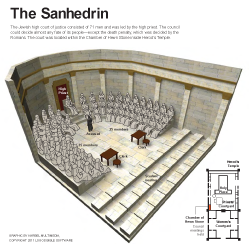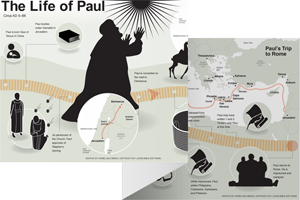5:1–11 The account of Ananias and Sapphira is full of ironic and sad twists. The story demonstrates how seriously people should take their commitments before God. |
5:2 kept back Ananias and Sapphira’s sin was not in failing to give the entire sum of money (see v. 4 and note); they sinned in pretending to honor Christ with the whole amount while withholding some of it for themselves. They lied in order to keep some of the money, certainly, but perhaps more significantly, they desired to be honored for their perceived generosity.
his wife was aware This establishes that Sapphira was complicit in this sin and no less guilty than Ananias.
5:3 Satan This was no small matter; this sin was a betrayal of Jesus and harmed the integrity of the entire community. Ananias’ act was equivalent to giving into the will of Satan, the primary spiritual enemy of Jesus and His Church (see note on Mark 1:13; compare Eph 6:11; 1 Pet 5:8).
the Holy Spirit Ananias did not merely lie to the apostles and fellow believers in the Church; his deceit is an affront to God Himself.
5:4 remain yours Peter’s rhetorical questions point out that Ananias was not obligated to sell his property or give the proceeds away. In addition, it was his choice to give all or part of the proceeds of the sale. Deception was not necessary to retain part of the money, so the only reason to lie was in order to claim greater honor and status within the Church.
not lied to people, but to God In Acts 5:3, and again in v. 9, the sin is described as lying to the Holy Spirit; here, it is lying to God. This language seems to implicitly assume the Holy Spirit’s identity as a divine person.
5:5 when Ananias heard these words Speaking in the power of the Spirit, Peter’s words are effective in bringing about the judgment that God pronounces upon Ananias.
great fear The community realizes with renewed gravity that Jesus’ lordship and the holiness of the community must be taken seriously.
5:7 three hours The irony of the story continues in this picture of the wife going about her day’s business knowing of her husband’s planned deceit yet ignorant of his unexpected death.
5:9 test Sapphira’s actions challenged God’s holy reputation within the Church and outside it, and her continued adherence to the lie when she was given a chance to tell the truth was a defiant act (v. 8). In making this decision, she placed herself not only in opposition to God but essentially claimed to be beyond his power and ability to hold her accountable for her actions.
5:11 the whole church The reputation of the power and seriousness of the Holy Spirit’s work now extends not only to those within the church but also to anyone who heard, regardless of whether they followed Jesus or not. The Christian community learns that God will protect the purity of the early church.
5:12–16 After the deaths of Ananias and Sapphira, the church continues its effort. Those outside the church seem to understand the nature of its power more than before. The church’s witness spreads beyond Jerusalem, eventually leading to increased opposition (vv. 17–26). |
5:12 signs and wonders A common marker in Acts, attesting to both Christ’s power and the apostles’ authority to carry the message of His kingdom (e.g., 2:43; 4:30).
 Miracles in Acts Table
Miracles in Acts Table
all together This repeats Luke’s emphasis on the unity of the early church (e.g., 1:14; 2:46; 4:24) and their sense of single-mindedness in faith and purpose.
Solomon’s Portico See note on 3:11.
5:13 none of the rest dared Refers to people who were intrigued by the Christian message or respected the Christian community but were afraid to join—probably in light of the deaths of Ananias and Sapphira (vv. 1–11).
5:14 even more Compare note on 2:47.
5:15 shadow The narrative does not confirm the truth or falsity of the people’s belief; the belief itself testifies to the reality of the apostles’ power and authority demonstrated among them.
5:16 the towns around Jerusalem Until this point the Church’s witness focused on Jerusalem. Its influence is spreading as people recognize the truth of the gospel and embrace the lordship of Christ (compare 1:8).
5:17–26 The Church’s increasing visibility ignites another conflict between the apostles and the religious leaders. The religious leaders’ lack of ability to stop the actions of the church demonstrates Peter’s earlier assertion that Christ is the only Lord with ultimate authority (4:12). |
5:17 filled In Acts the Greek word used here, pimplēmi, most often refers to a special enabling of God’s Spirit (e.g., 2:4; 4:8, 31). In what may be an ironic use of the word, the religious leaders being full of jealousy testifies to their failure to spiritually lead Israel to the true Messiah or to recognize their own need for forgiveness in Jesus’ name.
5:18 put them in the public prison The religious leaders assert their power by attempting to humiliate and discredit the apostles (and thus their message).
5:19 an angel Frequently in Acts, God rescues the apostles from danger or furthers the mission of the Church through angelic intermediaries (e.g., 8:26; 12:7; 27:23).
5:20 stand in the temple courts The apostles must stand as public proof that God’s purposes cannot be overturned and that Christ’s lordship is the true power in this spiritual struggle.
this life Jesus’ resurrection proves that He grants to believers new life that cannot be overcome by death (1:3; 3:15; compare Rom 6:8–10; John 14:6).
5:21–26 The religious leaders of Jerusalem demonstrate their inability to thwart the proclamation of the gospel (Acts 5:21). They also demonstrate their ineptitude when the soldiers cannot find the apostles, adding a note of comedy to the drama (vv. 23–24). Finally, news comes that the apostles are free, and the religious leaders fear them (vv. 25–26). |
5:21 Sanhedrin The supreme council in charge of many Jewish affairs in the land of Israel has convened to deal with the threat of the apostles and their quickly spreading message about the risen Jesus.
5:27–42 In Peter’s earlier speech in Solomon’s Portico (or Colonnade), he acknowledged that the people and their rulers had acted against Jesus in ignorance (3:17). Events have since escalated, and now Peter stresses that the leaders are pronouncing judgments contrary to God and His word. |
5:28 strictly commanded you The leaders assert their authority once more, insisting the apostles should have been loyal to them instead of to Jesus (see 4:18).
upon us Peter had testified that Jesus was crucified with the approval of the council (4:10), indicting them as accomplices in His murder.
5:29 obey God rather than men Peter pits the council’s motives and judgments directly against the will of God.
5:30 by hanging him on a tree The high priest had protested in v. 28 that the apostles’ preaching implied that the religious leaders were responsible for Jesus’ death. Peter now directly charges them with crucifying Jesus. His language alludes to Deut 21:22–23.
5:31 Savior Jesus rescues all who trust in Him from sin and its consequences. He is given this title at His birth (Luke 2:11).
to grant repentance The ot asserts that God must intervene in the life of Israel for them to have new spiritual life (Deut 30:1–6; Jer 31:31–34). This power to intervene in the life of people, and offer salvation, is attributed to Jesus.
forgiveness Israel’s hope is based on God’s gracious forgiveness of the sins of those who believe in Jesus (compare Isa 53:10–54:3; Zech 3:8–10; 12:10–13:1).
 Aphesis Word Study
Aphesis Word Study
Holy Spirit The work of the Holy Spirit to make the proclamation of the gospel effective and to perform miracles in the Church testifies to the reality of Jesus’ resurrection and salvation in Him.
5:33 infuriated The religious leaders’ rage contrasts sharply with the enthusiastic response to Peter’s first sermon (2:37).
5:34 Gamaliel A prominent rabbi and leader of the Pharisees during the nt period. Paul was his pupil (22:3).
put the men outside God intervenes through Gamaliel’s reasonableness in order to preserve the apostles’ lives.
5:36 Theudas The first-century Jewish historian Josephus mentions a Theudas who led a revolt around ad 44–46 (Josephus, Antiquities 20.97–98). This places Theudas’ revolt about a decade after the events in ch. 5. It may be that there was another rebel leader named Theudas (a relatively common name) since Gamaliel is referring to events that took place before the time Josephus mentions.
5:37 Judas the Galilean The Jewish historian Josephus mentions that this well-known figure led a revolt against Rome around ad 6 (Josephus, Antiquities 18.23; compare note on v. 36).
the census A census under Quirinius, the governor of Syria, in ad 6, later than the one taken around the time of Jesus’ birth (Luke 2:2).
5:38 keep away In light of the pattern set by earlier failed revolutionary movements, Gamaliel advises the leaders not to intervene. That is their safest route, in his opinion, regardless of God’s position toward the new Christian movement.
5:40 beat The Greek word used here, derō, probably refers to flogging with no more than 40 lashes (see Deut 25:3).
name of Jesus The council again focuses on suppressing the apostles’ proclamation of the good news about Jesus, His resurrection, and the forgiveness and new life God grants to those who trust in Jesus (compare 4:7, 18).
5:41 rejoicing Intimidation and physical violence do not deter the apostles. Instead, they find joy in being found worthy to suffer for Christ’s sake (compare 1 Pet 4:12–16)
 Chairō Word Study
Chairō Word Study
5:42 they did not stop The apostles do not falter in pursuing the mission Jesus has given them despite increasing danger from the religious leaders.

|
About Faithlife Study BibleFaithlife Study Bible (FSB) is your guide to the ancient world of the Old and New Testaments, with study notes and articles that draw from a wide range of academic research. FSB helps you learn how to think about interpretation methods and issues so that you can gain a deeper understanding of the text. |
| Copyright |
Copyright 2012 Logos Bible Software. |
| Support Info | fsb |
 Loading…
Loading…


